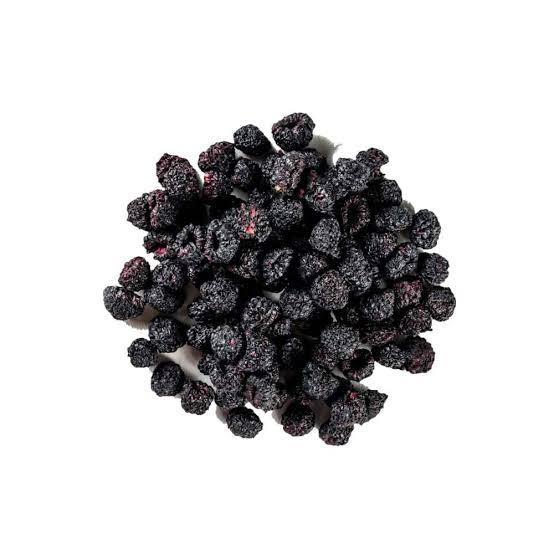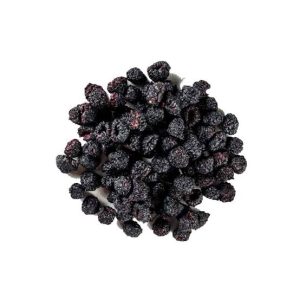
Blackberries
₹282.00 – ₹796.00Price range: ₹282.00 through ₹796.00 N/A
Blackberries
1) What are Blackberries
Blackberries are small, dark purple to black-colored fruits that belong to the Rubus genus of the Rosaceae family. They are composed of multiple small drupelets, each containing a seed, and have a juicy, slightly tart flavor.
2) How to Select Blackberries
Choose berries that are firm, plump, and deep black in color.
Avoid berries that are soft, mushy, or have any mold on them.
The berries should have a glossy sheen and should not be leaking juice.
A good berry should also have a sweet smell.
3) Benefits of Blackberries
Rich in antioxidants (especially anthocyanins), which help combat oxidative stress.
High in fiber, aiding digestion and maintaining healthy cholesterol levels.
Contains vitamins C, K, and A, boosting immune health, supporting blood clotting, and promoting skin health.
Provides essential minerals like manganese, magnesium, and folate.
Low in calories and high in water content, making them ideal for hydration and weight management.
4) Packaging Size Available
Blackberries are typically sold in small plastic containers or clamshells, commonly ranging from 500g to 1kg.
5) Uses of Blackberries
Eaten fresh as a snack or in salads.
Used in smoothies, juices, or cocktails.
Added to desserts like pies, tarts, jams, jellies, and yogurt parfaits.
Cooked into sauces for savory dishes or mixed into baked goods like muffins and cakes.
6) Health Benefits Suitable for:
Men: Blackberries support heart health, improve testosterone levels due to antioxidants, and aid in muscle recovery with their rich vitamin C content.
Women: Rich in folate, blackberries support pregnancy health, enhance skin appearance, and improve bone health (vitamin K).
Kids: Promotes healthy growth with vitamins and minerals; fiber helps digestion.
Elderly: Enhances brain function, supports eye health (due to lutein), and aids in reducing age-related inflammation.
7) Taste
Blackberries have a balanced flavor profile: sweet with a slightly tart, tangy finish.
The ripeness of the berry influences the flavor, with riper berries being sweeter and less tart.
8) How to Consume Blackberries
Rinse them gently under cool water before eating.
Eat fresh on their own or with yogurt.
Mix in salads, cereals, or oatmeal.
Use as a topping for desserts or blend into smoothies.
9) How to Store Blackberries
Store fresh blackberries in the refrigerator, unwashed, in their original container.
For long-term storage, freeze them by spreading them on a tray first, then transfer them into a sealed container or freezer bag.
Refrigerated blackberries can last 3-6 days, while frozen ones can last up to 6 months.
10) Product Life
Fresh: 3-6 days in the refrigerator.
Frozen: Up to 6 months when properly stored in the freezer.
Harvesting Time
Blackberries are typically harvested from late spring to early fall, depending on the region and variety.
They are picked when fully black and easily come off the stem.
After harvest, blackberries should be cooled immediately to maintain freshness.
Post-Harvest
After harvesting, they are usually stored in refrigerated environments to prolong their shelf life.
They should be handled delicately to avoid bruising, which can lead to quicker spoilage.
By following these guidelines, blackberries can be enjoyed fresh or in a variety of recipes, while their nutritional benefits can be maximized.
| packaging | 1000 GRM, 250 G, 500 G |
|---|
Related products
- 1000 GRMFrom: ₹1,024.00
- 500 GFrom: ₹522.00
Dates
- 1000 GRMFrom: ₹1,138.00
- 250 GFrom: ₹385.00
- 500 GFrom: ₹636.00
Blueberries.
Rose Berries
- 1000 GRMFrom: ₹910.00
- 250 GFrom: ₹328.00
- 500 GFrom: ₹465.00
Cranberries
- 250 GFrom: ₹317.00
- 500 GFrom: ₹499.00
Dried Cherry
₹328.00 – ₹910.00Price range: ₹328.00 through ₹910.00 N/A


₹385.00 – ₹1,138.00Price range: ₹385.00 through ₹1,138.00 N/A









Reviews
There are no reviews yet.